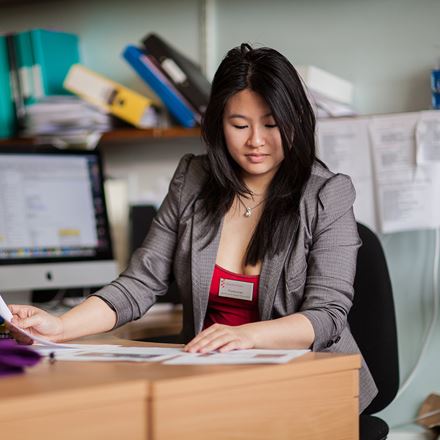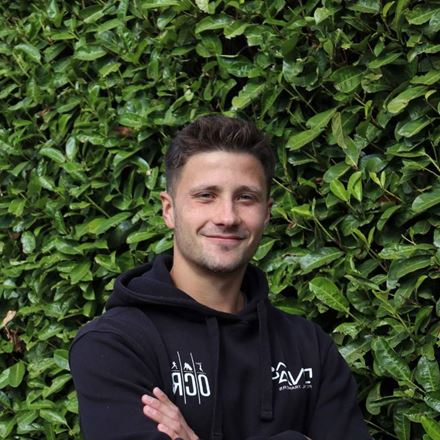Career prospects

Ignite your future: transform your degree into a successful career
Our degrees in sport and exercise science, sport coaching, sport psychology, strength and conditioning, sport therapy and physiotherapy will equip you with a host of industry-ready technical and transferrable skills that are necessary for achieving your professional ambitions, regardless of the destination. You will also have the opportunity to fuel your passion(s) through “hands-on” work experience via our placement, study abroad and enrichment initiatives.
SRES graduates continue to obtain highly sought after roles within the sport, health and exercise industry, including establishing careers as personal trainers, sport performance analysts, sport coaches, physiotherapists and more. In recent years, our graduates have obtained roles at prestigious organisations, such as Leicester Tigers Rugby Club, Ipswich Town FC, West Ham United FC and The Abbeyfields Clinic.
Our excellent degree programmes will support you to expand your professional horizons by preparing you to thrive in several booming sectors, such as:
- Private sector: sport teams; coaching businesses; private clinics; private schools.
- Public sector: Healthcare service (e.g., NHS); National Governing Bodies (NGBs); sport councils and charities; national and local institutes for sport.
- Teaching: junior schools; middle schools; upper schools; colleges (FE).
- Further education and research: PhD
- Self-employment and entrepreneurship.
Our graduates
With 85% of our biological and sport sciences undergraduate graduates in employment or further study (Graduate Outcomes 2025), our graduates have moved on to careers in a range of organisations and sectors.
In the stories featured here, our graduates talk about their time with Essex and where their degrees have taken them since they finished their studies.
Skills development
Technical skills
Your chosen field will require you to have a range of technical skills that you will be able to apply to your career.
Some of these may be specific to a certain field, such as physiotherapy and sports therapy, but others will be common across all degrees and tailored to your field. These skills can include:
- Physical assessments – Whatever your degree, you will learn how to carry out physical assessments on a broad range of potential clients. This could range from identifying how a professional athlete can strengthen muscles to improve performance, to diagnosing physical injuries and advising on the correct exercises to help the healing process.
- Equipment and software – You will be expected to be familiar with the equipment and software that is a standard within your career path. From electrotherapy modalities to performance analysis software, you will learn to use the tools of your trade and how to apply them to a range of situations.
- Data analysis – Throughout your degree you will learn how to identify and utilise different methods to collect data, how to analyse it using industry-standard software to draw conclusions, and how to counteract the risks around bias, both in data gathering and in analysis.
- Research – Even if you’re not planning to move into a research-focused career, research skills are still important as you will need to regularly update your knowledge on your field. You will learn about the types of quantitative and qualitative research methods used in your field, and how to choose the appropriate method. You will incorporate your data and communication skills to collate evidence and write up your work, and you will gain an understanding of the ethical considerations in scientific research.
Transferable skills
Your degree is more than the technical skills you learn in the classroom. There are a collection of transferable skills that are essential in all careers, whether you stick to a sports science or rehabilitation track or choose to move into something else.
The skills you will learn in your degree will include:
- Teamwork – Working as part of a team is important in any career. But in a sports science, coaching, or rehabilitation career path it’s essential. You will learn the importance of working as part of a team, listening to the opinions of your colleagues, and drawing on each other’s strengths and knowledge in order to successfully complete a piece of work or project.
- Communication – Communication is an essential life skill. Throughout your studies you will learn both written and oral communication skills through tasks such as in-class presentations and report writing. This includes learning to tailor your communications to your audience, and how to present your work effectively within word or time limits.
- Self-directed learning – The fields of sports science and rehabilitation are always changing and developing. Learning how to keep on top of the latest research and news is an important skill, as you will need to keep yourself up to date on the newest developments in your field.
- Organisation and time management – In your career you will be expected to manage your workload and prioritise your work to meet set deadlines. Through assignment deadlines, exam timetables and project work, you will learn how to manage your time effectively and organise your work to balance competing priorities.
Opportunities and support
Volunteering
One way to build up your experience is to take part in volunteering activities. Our School has a range of volunteering opportunities that our students can choose to take part in.
Staff running our physiotherapy and sports therapy courses arrange for a group of student volunteers to attend athletic events such as the London Marathon and the Colchester Half. With supervision from academics, students taking part will work with runners at the finish line to provide sports massages or exercise guidance to reduce the risk or impact of an injury.
Our School also has connections with local sports teams, such as non-league football clubs and school holiday groups. As a volunteer you may be managing activities for school children or helping coach youth players in a grassroots team. We also run the Human Performance Unit, based on Colchester campus, where students can volunteer to assist with outreach sessions with schools.
All these opportunities mean you can build up experience and apply the knowledge you gain from the classroom into real situations, while making a positive impact in a local community.
Self-employment and starting your own business
Many of our graduates move into self-employment or decide to set up and run their own business, such as a sports therapy clinic. This may be a common step in your field of interest, or if you’re an international student then perhaps you have already spotted a gap in the market in your home country.
Throughout your degree you can study modules on self-employment and entrepreneurship. You will learn how to write a business plan, how to look and apply for funding, and understand some of the hidden aspects that you may be unaware of, such as potential legal issues or how to hire and manage staff.
You can also take advantage of start-up events offered by the university, and facilities such as the Innovation Centre.
Additional qualifications
There are a broad collection of additional qualifications that you can undertake through professional organisations and sporting bodies, from first aid through to youth coaching badges.
Our School can support you in identifying and successfully completing relevant qualifications that may be helpful for you in finding work in your field. Some of these may already be built into your degree. For example, all BSc Sports Therapy students complete a first aid course in their first year, while BSc Sport Coaching students choose to qualify in either a Level 1 in football or an NCFE Level 2 Certificate in the Principles and Preparation for Coaching Sport.
Support offered by our School includes helping you identify volunteer opportunities to gain experience or a requisite number of hours with a team, identifying and accessing relevant reading materials, or access to facilities outside of lectures.
Placements
A work placement allows students to put their academic studies in to practice in a supportive environment, gain essential experience, and begin to build a professional network of contacts in your field.
Sports therapy and physiotherapy are practical courses by nature. Placements are built into these courses across undergraduate and postgraduate taught levels, as real-life experience is an essential part of your training for these roles. For these degrees your placements will be arranged through the School and will be allocated to give you professional experience in a range of settings.
Many of our other undergraduate degrees also let you undertake a placement year during your time at Essex. After successfully completing your second year, you will take a year to work in a relevant organisation, such as a football team or our Human Performance Unit. You will then return to the School to complete your final year and graduate.
Our School and the university’s careers team will support you to identify and apply for suitable placement opportunities, review your CV or application, and practice for interviews or assessments. Our students have undertaken placements at a range of sports clubs, including Tottenham Hotspur FC.
Study Abroad
Many of our degrees can include a year studying abroad at one of our partner organisations.
Studying abroad brings a host of benefits. You can experience a new culture, expand your linguistic skills, build a network of international contacts, and be taught by other experts in your field.
We have partnerships with organisations across the globe, including the USA, Australia, and European countries such as the Netherlands and France.
But if spending a year abroad isn’t for you, then our summer abroad opportunities may be more suitable. These range from summer schools through to volunteering, or even taking part in an internship that lets you gain work experience and travel overseas.
Research project
In your final year you will complete a research project which will showcase the skills you have developed through your degree and enhance your understanding of the research process in your field and the ethical considerations around your field.
With support from your academic supervisor, you will identify a problem or area related to your degree specialisation. You will develop a research proposal, including the methods you plan to use and a review of relevant literature, carry out your research, and write up your results in a scientific report. You may also design a poster showing your research or deliver an oral presentation about your work.
Along with demonstrating your skills, your project may inspire you to take further steps in a research career path. Some students use their undergraduate project as the basis for undertaking a research degree. Successful completion of a PhD can open doors to many senior roles in the public and private sectors, or it can lead to a career in research and academia.
Specialist professional skills modules
Your undergraduate degree will help you develop a range of professional skills that you will use throughout your career. We understand that it can be difficult to recognise and identify those skills, especially if you are the first in your family to attend university.
Our undergraduate degrees include core modules on professional skills or preparing for professional practice. These modules will help you identify the different skills that you are learning in the classroom, understand how to develop them further, and learn how to discuss and evidence them in job applications and interviews.
Chart Your Path and the Big Essex Award
Chart My Path lets you find volunteering and other extra-curricular opportunities that can help you build skills and develop your CV. These opportunities contribute towards the Big Essex Award, which verifies the opportunities you’ve taken up and showcases the contributions you've made to your skillset and the local community.
Volunteering opportunities are supported the Students' Union V-Team, who help organise projects including weekly volunteer sessions for long-term collaborations, or one-off and online opportunities.
Skills development events
Along with the skills you develop within our School, you will also have opportunities to learn additional skills offered by the university. These can range from one-off classes, such as improving numeracy or learning how to use library-based tools for research, to enrolling in year-long programmes such as Languages For All.
These events are open all students in the university and may be repeated each term, giving you multiple opportunities to take part.

You don't need to have your future all planned out. We offer a range of opportunities to build your CV, and gain valuable experience and expertise, including guidance on creating a start-up or becoming an entrepreneur, to ensure your career is on the right track for when you graduate.















